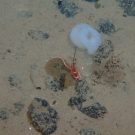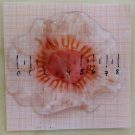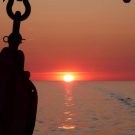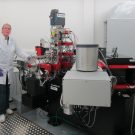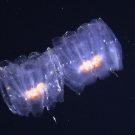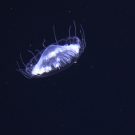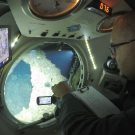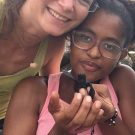At the bottom of the Ocean, in ~4000m water depth they can be found in high abundances: Manganese nodules. Industry and states are interested in these potato-sized objects as a new metal resource. But before commercial mining will start, the potential ecological impacts need to be investigated. Therefore, the project MiningImpact (funded through JPI Oceans) […]
Let’s talk about jellies!
Ina and Silvia from Syddansk Universitet in Odense, Denmark joined the cruise for the EU 2020 Horizon project GoJelly. One key goal of GoJelly is to improve the understanding of the role of jellyfish in marine ecosystems. Today it’s Ina and Silvia’s turn to tell us a bit about their research routine and experiences on […]
AL521 now posting from the Baltic Sea!
It’s spring time, and like every year for us this means that it is time to head out to sea with research vessel ALKOR to extend the Baltic Sea integrative long-term data series, running now in its 33rd year. The mission: to enhance the understanding of the complex and profound changes that Baltic Sea ecosystems […]
Sharing the caring: head of the NanoSIMS lab Dr. Angela Vogts
What is the nature of your work? I am the head of the NanoSIMS lab at the Leibniz Institute for Baltic Sea Research. The NanoSIMS facility is open to all scientists and thus I am in contact with different working groups of the institute as well with national and international scientists. I supervise a technician […]
Das GAME-Programm des GEOMAR startet neue Globalstudie zum Thema Mikroplastik
Das internationale Forschungs- und Ausbildungsprogramm GAME (Globaler Ansatz durch Modulare Experimente) lädt seit 17 Jahren Studierende der Biologie und verwandter Fachbereiche ein, sich an globalen Studien zu beteiligen, die die Auswirkungen menschengemachter Veränderungen auf das Meer untersuchen. Jedes Jahr widmet sich das Programm einer bestimmten Fragestellung und entsendet Teams aus Studierenden an Partnerinstitute auf der […]
Being a female scientist: Aquatic Biogeochemist Emma Kritzberg
Meet Emma Kritzberg, an associate professor of Aquatic Ecology with an emphasis on biogeochemical cycling in freshwater, estuarine and marine systems. Her job includes teaching 15%, doing service (director of undergraduate studies and committee work) 25%, and doing research 60%. What did inspire you to pursue a career in marine sciences/technologies? I did my undergraduate […]
POS532: Im Auge des Zyklonen/ Inside the eye of the cyclon
english version below Die biologische Ozeanographin Helena Hauss und die Ozeanographie-Studentin Anna-Christina Hans erzählen hier von ihrer spannenden Forschung an Strömungswirbeln im Östlichen Atlantik Eines der Ziele unserer Forschungsreise ist, die Rolle von Wirbeln (oder „Eddies“) für das pelagische Ökosystem der Kapverden besser zu verstehen. Wirbel sind rotierende Wasserkörper im Ozean von meist etwa fünfzig […]
POS532: Tracing elusive deep-sea squid using environmental DNA
[deutsche Version unten] by Stella Scheer and Veronique Merten The PhD students Stella Scheer and Veronique Merten of the Deep-Sea Biology Working Group at GEOMAR are reporting here about a method to trace marine animals without observing the animals During our cruise we sampled five different locations for environmental DNA (eDNA), including in- and offshore […]
POS532: First observations on deep water benthic communities in Cabo Verde coastal areas
(Deutsche Version unten) by Rui Freitas, 22-Feb-2019 Rui Freitas is a marine biologist and lecturer at the University of the Cape Verde. Here he reports about his two dives with the manned submersible JAGO down to the steep slopes of Santo Antão and Fogo. The deeper slopes of the Cape Verde islands have never been […]
Olá, daqui fala Anne e Mayara, Team Cabo Verde.
Here is a latecoming blog from GAME 2018. We have been the first GAME students to conduct experiments at the Ocean Science Centre Mindelo (OSCM) on the island of São Vicente that belongs to the archipelago of Cabo Verde. It was exciting for us to explore a new GAME site but also exhausting and laborious. […]
